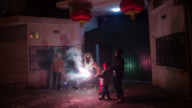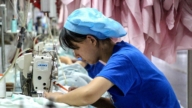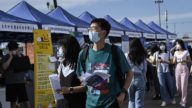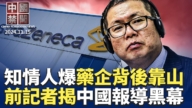【新唐人2013年07月13日讯】中共中央总书记习近平“到底想走怎样的路”﹖外界从习近平上任后开始的所谓“南巡”,像征改革,再到日前去河北省平山县的西柏坡村参观,肯定毛泽东,而纷纷猜测他的执政方向﹖请看以下报导。
河北平山县的西柏坡,是中共进驻北京执政前的最后一个农村驻地,也是中共夺权的指挥所所在地。
习近平7月11号下午,在参观这个所谓富有政治意涵的西柏坡时,还赞扬了毛泽东当年提出的两个务必。
但是,河南省南欧市的一位网友,12号在网上对习近平参访西柏坡的讲话留言表示,一不提官员财产(欧光化)、二不提法律面前人人平等了、三不提知法犯法罪加一等。
香港的一位网友也回复了这则报导,他说,人民需要什么你们很清楚、贪官不死讲什么都没用,当今这么多黑暗面:是因为金钱大于法、权力大于法、贪官不死,民无宁日。
在美的中国反政治迫害同盟主席刘因全表示,习近平看到了中共的危机,但由于他不敢采用民主制度这种法宝,所以他是一会儿向左看、一会儿向右看,表现前后失据。
刘因全:“习近平面临一些很难解决的国内问题,官员的腐败,官僚主义、贪污腐败、腐化堕落,就是到了已经没有办法收拾的地步了。所以他现在想搞整风、想叫大家洗洗澡、照照镜子。”
习近平最近的言行,与他刚上任立即南巡广东时的动作并不一致,当时他“力推改革、坚持开放”,并形容改革开放是“决定中国命运的关键一招”。
但是,习近平已经意识到了危机:去年底他一上台就强调,腐败会亡党亡国﹔今年6月又说“失去人心将亡党亡国”。
香港政治杂志《前哨》6月刊还透露,不久前习建议取消十五大以来的常委不得立案调查的内部规定。文章说,习近平为了政权的存亡,可能真要打大老虎,这对原政治局常委周永康和贾庆林不是好消息,原国家副主席、政治局常委曾庆红也是高危人选。
最近习近平动作更大,不仅提到党的领导和社会主义政权安全大局的新论调,还从7月1号开始派出45个督导组,分头对各省区市、中央国家机关部委、央企和中央直属金融机构、重点大学等,进行督察指导,正式全党拉开整风的帷幕。
大陆自由撰稿人朱欣欣表示,中共几十年的实践证明,一党专政的路是走不通的。
朱欣欣:“中共不彻底的和他过去的毛泽东所形成的这种专制思维传统决裂的话,中共本身它不可能彻底的焕发出活力和新生,只能彻底的被历史所抛弃,如果它坚持这样下去的话,会和毛泽东一样,最后被历史所抛弃,成为千古罪人。”
刘因全表示,毛泽东的话不会对那些贪官起任何作用,他们该怎样欺压百姓还怎样欺压百姓,该怎样贪污腐败还怎样贪污腐败。但是,如果习近平不进行彻底的政治体制改革、引进民主制度,那么就无法解决中共倒台的根本问题,倒台也是时间快慢而已。
采访/朱智善 编辑/宋风 后制/孙宁
Xi Jinping’s Hard Choice: Political Line
What is the real path that Xi Jinping intends to take?
The new leader of the Chinese Communist Party (CCP)
has been known for his southern tour in Guangdong, a signal of reform support.
Recently, Xi visited the Village Xibaipo in Hebei Province,
where he openly affirmed Mao Zedong.
What’s his policy? The question has been
heatedly speculated. Let’s take a look at the report.
Village Xibaipo was known to be the CCP’s last rural
revolutionary base before it came into power in China.
It was also the location of CCP’s headquarters for its
struggle for political power.
On 11th July, Xi Jinping visited Xibaipo, a representative
venue that has “deep political implications”.
Xi openly praised Mao Zedong’s talk given in Xibaipo,
which required the CCP cadres be modest, prudent and thrifty.
A netizen from China posts a comment about Xi’s speech.
It says that firstly, Xi didn’t mention on
the officials assets declaration go public;
Secondly, Xi didn’t cover equality before the law;
Thirdly, Xi didn’t talk about deliberate law violation
shall be found doubly guilty.
A Hong Kong netizen also commented on the news.
The post: You’re fully aware of what the people need.
It is no use to say anything if corrupt officials
are still alive.
Today, China is riddled with darkness,
a result of money and power overriding law.
So the people won’t live in peace without the
death of corrupt officials.
Anti-Political Persecution Alliance of China,
Chairman, Liu Yinquan believes that
Xi dares not to embrace democracy,
though he has realized the crises facing the CCP.
Thus, Xi acts in both ways, sometimes swaying
to the left, and sometimes to the right.
Liu Yinquan: “Xi Jinping faces some hard nuts to crack.
These include corruption, bureaucracy, and depravation.
So he is trying to carry out an ideological rectification
within the CCP.”
Xi Jinping’s recent talk differs from his remarks
during an earlier southern tour in Guangdong.
At the time, Xi pushed for reform and opening-up policy.
In his words, the reform and opening-up was
“the key that determines China’s destiny.”
Now Xi has been made aware of the crisis.
Right after assuming office in 2012,
he warned that corruption would ruin the CCP
and the People’s Republic of China.
This June, Xi warned again that losing public support
would ruin the CCP and the P.R. China.
Hong Kong’s political magazine, Outpost, revealed that
Xi recently proposed to abolish a CCP internal policy.
It refers to a ban on criminal investigation into
members of Politburo Standing Committee.
The ban has been implemented as of the 15th CCP Congress.
The Outpost reviewed that Xi might really want to
target “big tigers” for the sake of saving the CCP.
This would not be good news for Zhou Yongkang,
Jia Qinglin, and Zeng Qinghong, the article stated.
The three were all former Politburo
Standing Committee members.
Recently, Xi has recently acted more. He has stressed
the CCP’s leadership status and the regime’s security.
Furthermore, on 1st July, he sent 45 task groups
to supervise work nationwide.
The targets include ministerial departments,
centrally-administered state-owned enterprises
and financial institutions, and key universities.
This marked the formal opening of
the CCP ideological rectification campaign.
China’s freelancer, Zhu Xinxin, comments.
He says that decades of CCP rule has proven that
“one-party dictatorship" is a dead-end road.
Zhu Xinxin: “If the CCP doesn’t completely
discard its autocratic mode of thinking,
which was formed during Mao’s reign, it won’t be
reborn, but will only be abandoned by history.
If it insists on going along this road, it will finally
become a sinner, like Mao Zedong.”
According to Liu Yinquan, Mao’s talks will not play
a role in those corrupt CCP officials.
Their bullying and corruption will continue.
Liu warns that if Xi still refuses to begin a thorough
political reform, and to implement democracy,
the CCP’s downfall remains just a question of time.



























